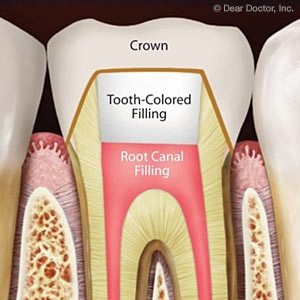
You might be a bit apprehensive if your dentist recommends a root canal treatment, especially if it’s your first. That’s understandable: Popular culture has portrayed the root canal as an unpleasant experience.
But as a routine dental procedure, root canal treatments have been responsible for saving millions of decayed teeth. And, with local anesthesia, the procedure is painless. In fact, a root canal treatment stops pain that often results from advanced tooth decay.
So, let’s take the mystery out of the root canal. Here’s the 411 on this vital but often misunderstood dental procedure.
Why the name “root canal”? The terms for the procedure—root canal therapy, root canal treatment or simply “root canal”—arise from one of the principal parts of the tooth involved, root canals. These are tiny passageways that lead from the tooth’s innermost layer, the pulp, to the tooth roots. While treatment often focuses on decay or diseased tissue within the pulp, the root canals can be infected too and must be included in the later filling process.
Who can perform a root canal? All general dentists are trained in basic root canal procedures. Depending on your tooth’s condition, your family dentist may be able to perform it. But if your tooth has an intricate root canal network or some other complication, you may need an endodontist, a specialist in interior tooth and root treatments. Endodontists can perform advanced root canal techniques and have the specialized equipment to handle intricate cases.
What happens during a root canal? Although details may vary depending on the type of tooth and extent of decay, there’s a basic process for all root canal procedures. After numbing the tooth and surrounding tissues, the dentist drills into the tooth to access the inner pulp chamber and root canals, then removes the diseased tissue and disinfects the empty chamber and canals. After preparing the canals, the dentist then fills the empty spaces. This, and subsequent sealing and crowning, protects the tooth from future decay.
After the procedure you may have some minor soreness for a few days, which is usually manageable with mild pain relievers like ibuprofen or acetaminophen. This discomfort will diminish with time, and your tooth will have a new lease on life.
If you would like more information on root canal treatment, please contact us or schedule an appointment for a consultation. You can also learn more about this topic by reading the Dear Doctor magazine article “Root Canal Treatment.”
